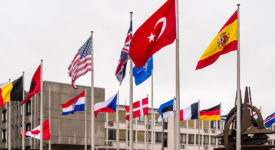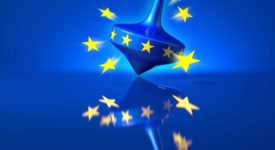While Europe has a decent record in dealing with the consequences of its bloody modern history, it is only now beginning to confront the collective amnesia regarding its behaviour during the colonial era. If the Union wants to realize its geopolitical ambition to be a global player, EU leaders should deal with the impact of past colonial misdeeds head-on and ensure that EU diplomats and younger Europeans are aware of how our history affects the present. To that end, Europeans have warmly embraced US President Joe Biden as a friend and partner. As they seek more geopolitical impact, EU leaders would do well to also listen to the president’s views on history and the power of remembrance. Speaking on the centenary of the 1921 Tulsa race massacre, Biden urged Americans to be honest about their history, insisting that great nations “come to terms with their dark sides”.
DEALING WITH THE PAST —- EU leaders readily reference Europe’s recent history of bloody continental wars and persecution of minorities, including the horror of the Holocaust. But they are largely silent when it comes to memories of imperialism and colonialism, preferring to view the EU as a ‘virgin birth’, with no responsibility for member states’ colonial past. However, most EU member states were still colonial powers when the European Economic Community, the EU’s predecessor, was founded in 1957. Some, like the UK, Spain and Portugal, still had colonial possessions when they joined years later. The EU’s partners in the developing world, many of them former European colonies, from India to Ethiopia, have so far been too polite to mention Europe’s colonial legacy or the bloc’s still difficult relationship with its ethnic minorities and Europeans of colour. The EU’s Fundamental Rights Agency recently reported that millions of people across the EU experience hate-motivated violence and harassment due to their ethnic and/or migrant background, skin colour, religion, gender, sexual orientation and/or disability.
But the mood is changing. During the Munich Security Conference, Wang Yi, China’s foreign minister, responded to allegations of genocide in Xinjiang by noting that “Europe certainly knows about genocide.” As geopolitical tensions with Beijing escalate, China will likely continue to hammer home its role as a ‘Me Too’ victim of European colonialism in its discussions with Asian, African and Latin American nations. The EU has reacted partially to China’s rhetoric by promising a new “partnership of equals” with Africa and regularly visiting the African Union headquarters. African countries, however, are not playing ball. The EU’s singular focus on migration from the continent is one irritant in EU–Africa relations, but what African diplomats refer to as the EU’s ‘neo-colonial’ approaches is another. No surprise then that the EU–Africa summit has been twice postponed. Or that the much-touted, new ‘post-Cotonou’ EU deal with African, Caribbean and Pacific states struck last year has run into opposition from Hungary because it is supposedly too soft on migration.
THE PAST IS THE PRESENT —- Today’s European political landscape is still coloured by past conflicts (e.g. Balkans, Northern Ireland) and peace settlements (e.g. Hungary’s borders post-Trianon, enclave of Kaliningrad). But rarely have EU leaders sought to come to terms with Europe’s colonial legacy. Now, prompted by Black Lives Matter, many Europeans are starting to investigate their own legacy of colonialism, slavery and genocide. There have been civic movements in France, Belgium, Germany and elsewhere to pull down imperial statues, rename streets named after colonial figures and advocate the ‘decolonisation’ of Western education. During a trip to Kigali in May, French President Emmanuel Macron said that France “must look history in the face and recognise the share of suffering that it inflicted on the Rwandan people” during the 1994 Rwandan genocide. German Foreign Minister Heiko Maas also recently admitted that his country caused “immeasurable suffering” to the Herero and Nama people during German colonial rule of what is now Namibia. He added that “from today’s perspective”, these events amounted to “a genocide”, and that Berlin would pay Namibia €1.1 billion in a ‘gesture of reconciliation’.
Last year, Belgium’s King Philippe, an indirect descendent of the infamous Leopold II, wrote to Congolese President Félix Tshisekedi to voice his deepest regret for the “suffering and humiliation” inflicted during Belgium’s colonial occupation. He added that racial discrimination is still “all too present in our societies”. Belgium has now agreed to return most of the looted treasures in the Royal Museum for Central Africa to the Democratic Republic of Congo. King Willem-Alexander of the Netherlands has admitted that the Dutch used “excessive violence” in Indonesia. Although the monarch did not mention Dutch involvement in the lucrative transatlantic slave trade, a new, ground-breaking exhibition at the Rijksmuseum does reveal how slavery permeated every level of Dutch society, both in the colonies and at home. The behaviour of Spain and Portugal has not been forgotten in Central and South America, nor in Sub-Saharan Africa. Britain, still regarded as a European power despite Brexit, has never apologised to China for the Opium wars, nor for its appalling behaviour in India.
HISTORICAL AMNESIA —- These expressions of regret from European leaders and monarchs are not formal apologies and are hedged with caveats to avoid any legal liability and demands for financial reparations. References to specific events rather than the imperial enterprise in its entirety do little to counter populists’ self-congratulatory, nostalgic and nationalist narratives of Europe’s ‘civilizational’ past. These sentiments were at the fore in the Brexit debate and continue to play a prominent role in British politics, with ministers now deciding who should sit on museum boards. Asking forgiveness also does not reveal just how deeply embedded discriminatory ‘us and them’ mindsets and ‘white saviour’ narratives are in the EU’s foreign and security policies, attitudes towards migration and climate change, development cooperation and trade. The EU’s claims of being the developing world’s best friend and the need for global solidarity stand in contrast to recent examples of vaccine nationalism and hoarding by EU states and their reluctance to agree to a waiver on vaccine patents. As Federica Mogherini, the former EU foreign policy representative, has stated, the sorry state of EU refugee centres and the many ways in which EU governments continue to trample on international conventions on asylum hurt the bloc’s global reputation.
Europe’s historical amnesia has implications for EU foreign policy. To many, if not most, developing countries, the EU is overwhelmingly white, rich, protectionist, racist and prone to hypocrisy. Some EU officials claim that what happened in the past two centuries is irrelevant and that not all member states engaged in colonialism. Others insist that the imperial enterprise also involved the complicity of local elites, many of whom then became postcolonial national leaders. Such arguments miss the point. What counts is how third countries view Europe – and for many, their attitudes are certainly coloured by the experience of gunboat diplomacy, economic and cultural imperialism, and what many describe as modern-day complacency and arrogance. After all, European museums are filled with looted artefacts from former colonies.
BACK TO SCHOOL —- The EU must ensure that its diplomats and officials have a proper understanding of Europe’s colonial past and how Europe is really viewed around the world. This should go hand in hand with a broader public education campaign about the true impact of colonialism, racism and the slave trade. Unless national school curricula begin to offer a truthful account of colonialism, younger Europeans are also unlikely to learn ugly historical realities. The vicious cycle of historical ignorance must be broken. In addition, the EU needs to follow through on its commitments on paper to equal opportunity – not just for women but also for ethnic minorities. The EU public service should reflect all European citizens. Not just to ensure better representation, but also because excluding non-white citizens from EU institutions means missing out on the talent, experience and knowledge of people who could bring some much-needed cognitive diversity to the crafting of EU foreign policy. To make matters worse, in contrast to staff in American, Canadian, and post-Brexit British embassies, there are very few Europeans of colour in EU delegations.
That is regrettable. A Europe that talks endlessly of diversity and inclusion and calls out discrimination of ethnic minorities abroad would benefit massively from showcasing its own ability to walk the talk. The EU has an important mitigating role to play in a world dominated by geopolitical competition. It has the right instincts on promoting multilateralism and expanding its network of global partners. The EU’s regulatory power and model of regional integration continue to inspire many nations across the world. This makes it even more compelling that EU leaders, politicians and policymakers acknowledge the importance of righting historical wrongs and become serious about removing all remnants of colonial mindsets from their global interactions. A promising start has been made as EU leaders begin cautiously to fight systemic racism at home and break decades of silence over their colonial past. But EU foreign and security policy will continue to suffer unless European nations and EU institutions take a closer look at the impacts of their colonial history on their 21st-century ambitions.
‘History Matters for the EU’s Geopolitical Ambitions’ — Commentary by Fraser Cameron and Shada Islam — European Policy Centre / EPC.







